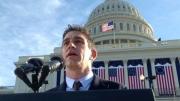As a child, Richard Blanco—the youngest and first openly gay and Latino poet ever to read a poem at a U.S. presidential inauguration—often stood in the corner, silently observing his surroundings and memorizing even the smallest details. Living in the shadow of his grandmother, who verbally abused him for being gay, Blanco was withdrawn and introverted—an observer of the world instead of a participant.
“In order to survive emotionally, I learned to read my environment very carefully and then craft appropriate responses that would hopefully prevent abuse and ridicule from my grandmother,” Blanco told Harvard students packed into the Winthrop House Junior Common Room. “I explained to my husband-to-be that I am still that quiet, repressed boy whenever I am in a room full of people, trying to be as invisible as possible, but taking in every detail—sensory as well as emotional—that will eventually surface in a poem.”
Sponsored by the Harvard Queer Students and Allies (QSA), Blanco shared stories from his childhood, as well as excerpts from his poignant essays and poems about his own LGBT identity, in a discussion he called “Navigating Identities.” Recalling a writing exercise called the “10 times 10,” Blanco asked audience members to think of 10 things that made them different from anybody else in the room. Being able to pinpoint these various identities, he said, has shaped his life as a writer.
Calling himself a “Cuban American, slash poet, slash gay, slash engineer, living in Maine these days,” Blanco said he was impressed by how many students understand that they do not have to focus on only one particular area. “It’s amazing how many of you are double majors,” he declared. “There’s suddenly this idea that you don’t have to be this one thing anymore. I want to acknowledge how complex we all are as individuals, and how many identities you have to negotiate every single day—how many hats we have to wear.”
Born in 1968, Blanco immigrated as a child with his Cuban family to Miami, where he was raised. His work, such as his most recent book Looking for the Gulf Motel (2012), mainly explores his Cuban heritage and his role as a gay man in Cuban-American culture. “It's trying to understand how I fit between negotiating the world, between being mainstream gay and being Cuban gay,” he recently told the The New York Times. The poem he recited at President Barack Obama’s inauguration, “One Today,” was called “a humble, modest poem, one presented to a national audience as a gift of comradeship, and in the context of political, pop, and media culture, a quiet assertion that poetry deserves its place in our thoughts on this one day, and every day,” by The Los Angeles Times.
“I strive to capture sadness and transform it through language into something meaningful and beautiful,” Blanco said to the Harvard students as he read from his personal essay “Making a Man Out of Me.” “Although through most of my writing career I have never conspicuously written for or about the gay community,” he explained, “thematically I feel I have unconsciously been a very gay writer all along in this sense—trying to make lemonade out of lemons, castles out of mud, beauty out of pain.”









